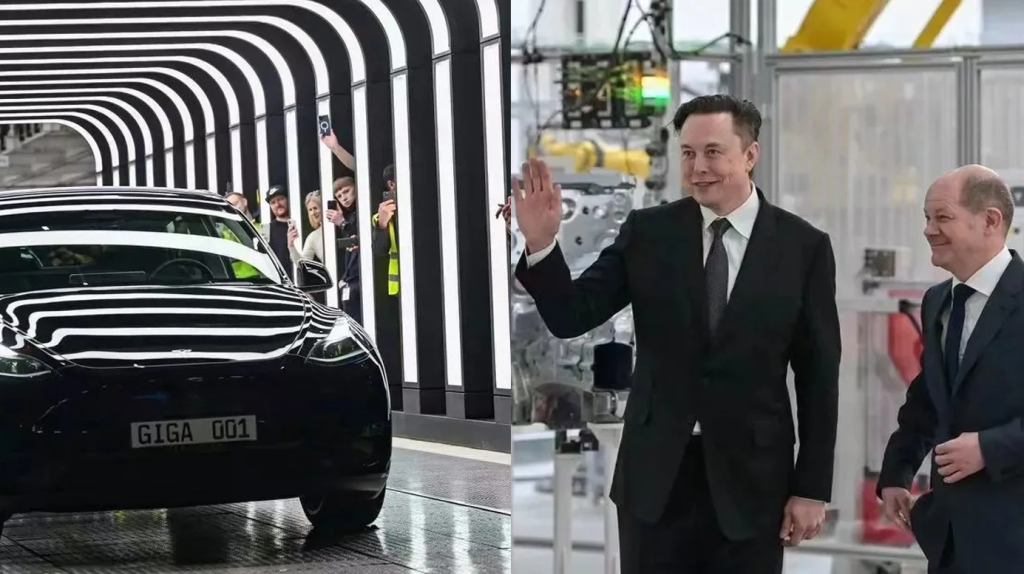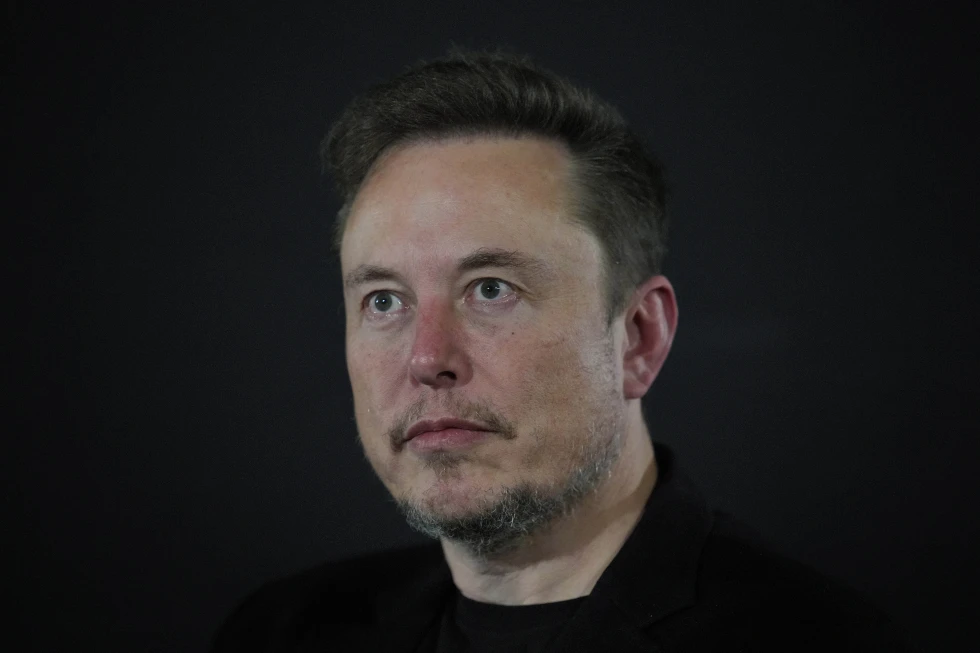Elon Musk, the controversial CEO of Tesla and SpaceX, recently made headlines for his visit to Israel, where he toured a kibbutz attacked by Hamas militants and held talks with top leaders.
This visit comes at a time when Musk has been facing criticism for endorsing an antisemitic conspiracy theory and accusations of hatred flourishing on his social media platform X.
During his visit, Musk met with Israeli President Isaac Herzog, who reportedly scolded him over the content on his platform, which was previously known as Twitter.
He also joined Israeli Prime Minister Benjamin Netanyahu for a tour of the Kfar Azza kibbutz, a rural village that was the target of a deadly assault by Hamas militants, which marked the beginning of a war.
Musk, wearing a protective vest and accompanied by a phalanx of security personnel, used his phone to capture photos and videos of the devastation, as seen in video footage released by Netanyahu’s office.
Musk’s visit to Israel comes at a crucial time, as the country and Hamas had recently reached a deal to extend a cease-fire for two more days. His presence in the region has sparked both interest and controversy, given his recent actions and statements on social media.
The visit raises questions about the role of influential figures such as Musk in international affairs and the responsibility that comes with their platform and influence.
As a prominent figure in the tech and business world, Musk’s actions and statements carry weight and can have significant implications.
His visit to Israel, in the midst of a conflict, sends a message about the importance of engaging with global issues and the impact of such engagements.
Furthermore, Musk’s visit to the kibbutz attacked by Hamas militants highlights the human cost of conflicts and the need for global attention and support in such situations.
By documenting the devastation and meeting with top leaders, Musk has drawn attention to the plight of the people affected by the conflict and the importance of finding solutions to such crises.
However, Musk’s visit also raises concerns about the intersection of politics, business, and social media. His endorsement of an antisemitic conspiracy theory and the accusations of hatred flourishing on his social media platform have sparked outrage and calls for accountability.
The meeting with Israeli leaders, in this context, brings into focus the responsibility of influential figures in addressing and combating hate speech and misinformation.
In conclusion, Elon Musk’s visit to Israel and his engagement with the aftermath of the conflict with Hamas have sparked both interest and controversy.
The visit highlights the role of influential figures in global affairs and the responsibility that comes with their platform and influence. It also draws attention to the human cost of conflicts and the need for global attention and support in such situations.

However, it also raises concerns about the intersection of politics, business, and social media, and the responsibility of influential figures in addressing hate speech and misinformation.
As the world continues to grapple with complex global issues, the actions and engagements of influential figures like Musk will continue to be under scrutiny.
It was a solemn and poignant moment when the CEO of Tesla, along with the prime minister, visited the damaged homes of the victims, including the family of Abigail Edan.
The 4-year-old girl, who held dual Israeli-U.S. citizenship, had been through a harrowing ordeal after her parents were killed and she was held hostage by Hamas. It was a relief to hear that she was released on Sunday, as part of the latest round of exchanges during a cease-fire in Gaza.
The visit by the CEO and prime minister not only showed their solidarity with the victims and their families, but also highlighted the importance of international cooperation and support in times of crisis.
It is a reminder that even in the face of tragedy, there can be hope and resilience, and that the efforts of individuals and leaders can make a difference in the lives of those affected by conflict and violence.
During a conversation with Prime Minister Netanyahu that was streamed on X, Elon Musk expressed his shock at the scene of the massacre, particularly troubled by the video and photos of civilians, including children, that were shown to him.
While they discussed a range of topics related to the conflict and the protests it has sparked, they notably did not address the issue of antisemitism online.
This was a missed opportunity, as Netanyahu had previously urged Musk to help combat such hatred. Nevertheless, Musk expressed his willingness to be involved in building a better future.
However, Israeli President Herzog did not shy away from confronting Musk about the prevalence of hatred and antisemitism on the platforms he leads.
The meeting also included families of hostages held by Hamas in Gaza, highlighting the gravity of the situation and the need for influential figures like Musk to take a stand against such atrocities.
During a meeting with Musk, Herzog emphasized the significant impact of anti-Semitic sentiments on global behavior and urged Musk to take responsibility in addressing this issue.
In response, Musk acknowledged the emotional toll of recent events and expressed a commitment to combating hate. He highlighted the dangerous influence of propaganda, citing the example of Hamas militants who have been indoctrinated with falsehoods since childhood.
Despite his efforts to address the issue, Musk has faced criticism from organizations such as the Anti-Defamation League for allegedly tolerating anti-Semitic content on X, a platform he acquired last year.
The platform’s content has come under increased scrutiny following the conflict between Israel and Hamas, prompting major corporations like Disney and IBM to pull their advertising due to concerns about the platform’s association with pro-Nazi and white nationalist material.
This situation underscores the urgency of addressing hate speech and ensuring that platforms like X do not perpetuate harmful ideologies.
It is deeply concerning to see a public figure like Elon Musk making such inflammatory and insensitive comments regarding the Jewish community.
It is important for individuals in positions of power and influence to recognize the impact of their words and the responsibility that comes with their platform.
Accusing an entire group of people of hating others based on their race or ethnicity is not only false and harmful, but it perpetuates harmful stereotypes and contributes to the spread of hate speech.
Furthermore, the fact that Musk has described himself as a free-speech absolutist does not excuse or justify his comments.
Free speech comes with the responsibility to use words that do not incite hatred or discrimination towards any group of people. It is disappointing to see someone with such a large following and influence not taking this responsibility seriously.
The decision to sue Media Matters and the settlement with the Israeli government over his Starlink satellite internet company also raise concerns about Musk’s actions and the impact they have on various communities.

It is crucial for individuals and companies to be held accountable for their words and actions, especially when they have the potential to cause harm or perpetuate discrimination.
It is my hope that Elon Musk and other public figures take the time to educate themselves on the impact of their words and strive to use their platforms for positive and inclusive messaging.
It is also important for individuals and organizations to hold them accountable when they fail to do so. In a time where social media and online platforms have such a significant influence, it is crucial for all users to promote understanding, empathy, and respect for all communities.
The recent agreement between Elon Musk’s Starlink and the Israeli Ministry of Communications has brought about a significant change in the way satellite units will be operated in Israel.
According to the Communications Minister, Shlomo Karhi, any operation of Starlink satellite units in Israel, including the Gaza Strip, will require the approval of the Israeli Ministry of Communications.
This move comes after a previous online altercation between Musk and Karhi, where the former had promised to provide connectivity to internationally recognized aid groups in Gaza.
Karhi had expressed his concerns that Hamas could potentially use the service for militant activities, leading to a rebuke from the Israeli Communications Minister.
This new agreement is a clear indication of the Israeli government’s commitment to ensuring that any technology or service provided within its borders is used for peaceful purposes and not to support any form of violence or terrorism.
